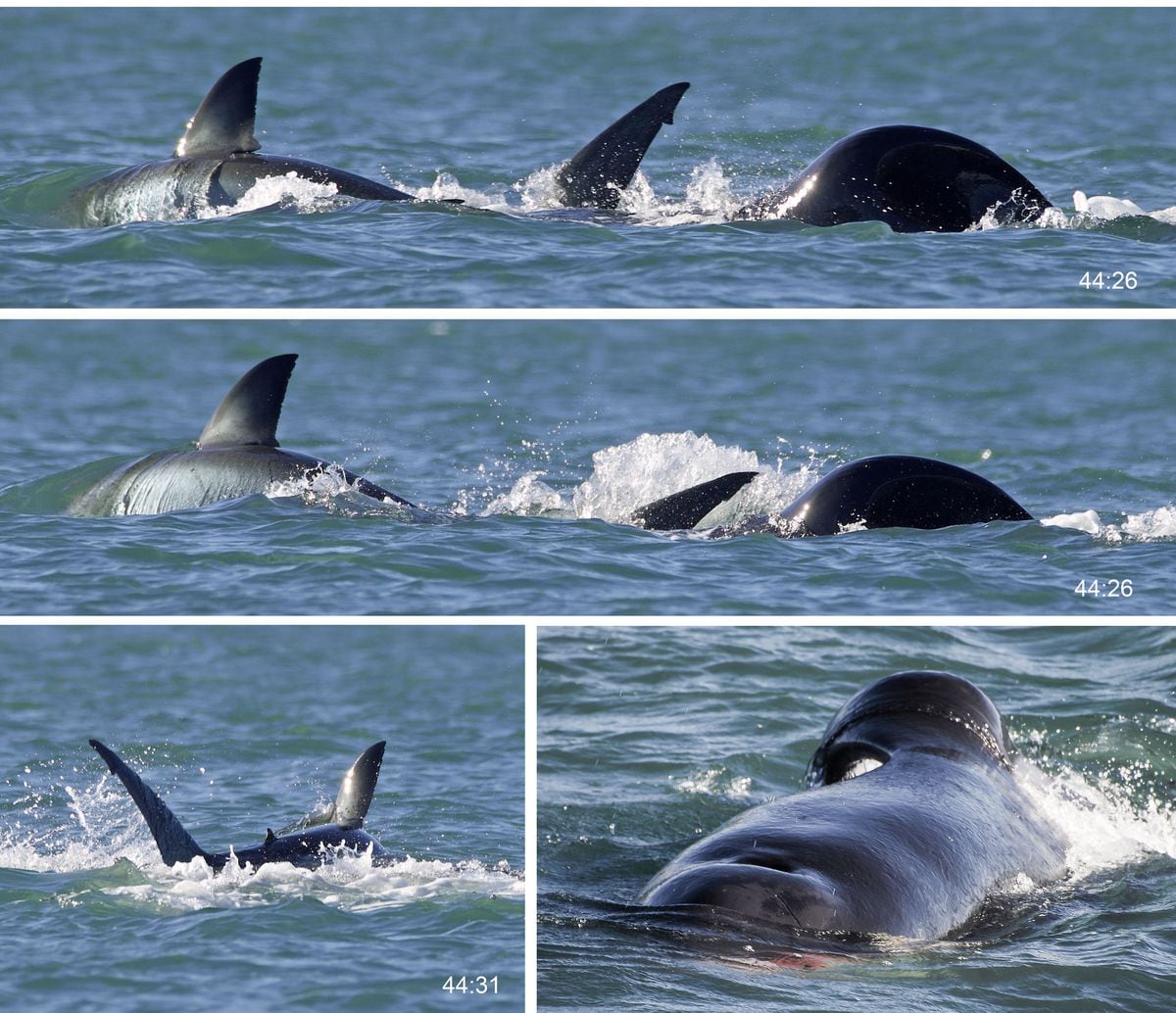Orcas, also called killer whales, are known for working in groups.
Together they attack sea lions, seals and in recent times even private sailboats and yachts as well.
But teamwork is not for
Starboard,
which prefers to act alone.
She is the first orca in history that has been observed individually hunting a great white shark and devouring it in just two minutes.
The astonishing predation was captured by a group of scientists off the coast of Mosselbaai (South Africa) and represents unprecedented behavior that highlights the exceptional dexterity of orcas and their abilities as apex predators.
The findings were published this Friday in the scientific journal
African Journal of Marine Science
.
Marine biologist Alison Towner from Bangor University (Wales, United Kingdom) is a specialist in white sharks in the region.
Thanks to her observation of these large predators, she and her team managed to identify that since 2017 a pair of killer whales were hunting and killing sharks off the coast of South Africa, expelling large numbers from their natural settlement sites.
They published their findings in the same journal in 2022 and continued documenting the behavior, until they encountered the orca
Starboard
, which gets its nickname from a wound on a dorsal fin.
The team observed that
Starboard
acted alone and managed to incapacitate and consume a 2.5 meter shark in an astonishing two minutes.
“The moment
Starboard
quickly hunted down my favorite shark species was both devastating and powerful,” details Towner.
In these interactions, at least two other sharks were killed by killer whale attacks, as evidenced by the nearby discovery of a second 3.5-meter carcass.
Photographic sequence of an orca individually attacking a white shark.Christiaan Stopforth, Drone Fanatics SA
When hunting together, orcas can surround prey and use their combined intelligence and strength to attack.
Although they can take down large animals individually, this is the first case involving one of the world's largest predators.
The dexterity with which
Starboard
devoured the shark indicates remarkable abilities, as the research team detected that the orcas are showing a strong preference for extracting and consuming the livers, which are rich in lipids.
They have described this feat as specialized eating behavior.
“The observations add more layers to the fascinating story of orcas and their capabilities as intelligent predators,” adds Towner.
Although he admits that it cannot be speculated that this means a change in hunting strategy, he does believe that it is likely a technique employed previously.
“Orcas can quickly learn new hunting techniques on their own or from others,” he adds.
Paul Tixier, a marine biologist at the University of Victoria in Canada, explains that white sharks in this region have a low risk perception toward orcas because hunting them is “a novel behavior.”
These dynamics could exert selection pressures if sharks continue to perceive killer whales as low risk.
Great white sharks are classified as a vulnerable species on the International Union for Conservation of Nature's Red List.
More information
Why orcas hit sailboats: a viral trend among young women
Despite the surprising nature of the discovery, the fact has also worried experts.
The event, they explain, raises critical questions about the impact and ecological repercussions that predation by killer whales can cause on shark populations in the region.
“The decline of sharks in the oceans entails cascading impacts on marine ecosystems due to the imbalance in predators,” details the author.
Therefore, they consider it essential to understand ecological dynamics for marine conservation efforts.
Specialists point out the need to continue investigating the causes, but point to human pressures as a possible cause of the displacement of the orcas.
Especially for activities such as hunting and fishing.
“White sharks are displaced and patterns of survival and relocation pose potential risks, such as overlap with fishing or human encounters in remote coastal areas further east,” details Towner.
This species acts as an important biological flow of nutrients between ecosystems, so abandoning an area or less success in searching for food can have long-term consequences on nutrient cycling.
A second great white shark attacked by killer whales was found on the coast near the scientists' observations.Christiaan Stopforth, Drone Fanatics SA
Esther Jacobs of the marine conservation initiative
Keep Fin Alive
acknowledges that although she was surprised to see the predation, she was also concerned about the “profound impact” it could have on marine ecology.
Both the author and Jacobs suggest that in the face of changing environmental conditions, constant ecological surveillance is necessary to establish adaptive conservation strategies.
“Collaboration with observers on land, tourists on boats, and various organizations played a critical role in capturing crucial data and video recordings of predation events and can play a critical role in conservation efforts as well.”
They conclude that more research is needed to understand the long-term implications of these interactions between killer whales and great white sharks.
Tixier points out as a key strategy to determine the total number of orcas that feed on white sharks and whether they all belong to the same population or several.
“Despite my admiration for these predators, I am increasingly concerned about the marine ecological balance,” Jacobs admits.
You can follow
MATERIA
on
,
X
and
, or sign up here to receive
our weekly newsletter
.

